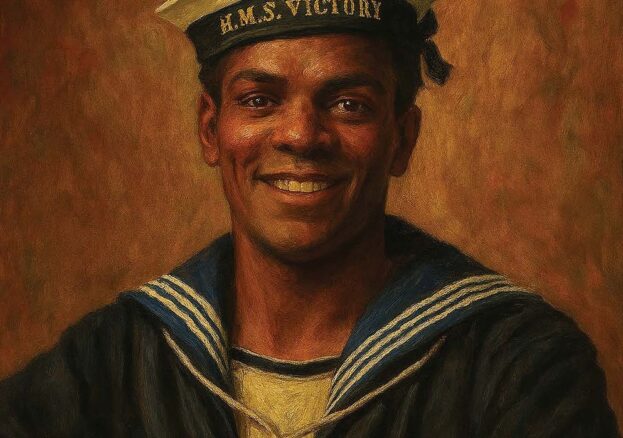
Richard “Dickie” Barr was born in 1888 at Perranuthnoe, near Penzance, the son of a miner of African descent and a Cornish mother. He grew up locally, finding early work first as a bellboy at the Western Union Hotel and then going to sea as a steward aboard the SS Trematon—a set of jobs that reflected the coastal economy that shaped so many Cornish lives at the turn of the century.
When war came in 1914, Barr enlisted in the Royal Naval Volunteer Reserve (RNVR). Like many RNVR men, he would serve in the Royal Naval Division—a unique fighting force created at Winston Churchill’s instigation that sent surplus naval reservists to fight as infantry while remaining attached to the Navy. Barr was posted to Nelson Battalion, one of the division’s units named for Britain’s great admirals.
His service mapped the geography of the war’s hardest fronts. With the Royal Naval Division he saw action at Gallipoli in 1915 and later on the Western Front, including the Battle of the Ancre in November 1916—the final phase of the Somme—where he was seriously wounded. The Division’s objectives at Ancre placed Barr and his battalion amid one of the conflict’s bloodiest campaigns.
Demobilised in 1919, Barr returned to west Cornwall and resumed civilian life in and around Penzance, earning his living as a labourer. In peacetime he was known as a steady presence—serving, among other roles, as a Standard Bearer with the local British Legion and as a familiar figure in community life and billiards halls.
Marriage and family anchored him in the years after the war. He and his wife raised children in Cornwall, and his sons would go on to reflect the same commitment to service that had marked their father’s life. Two of them, Richard Barr Jr. and William Barr, served in the armed forces during the Second World War, carrying the family’s military connection into another generation. Their stories, like their father’s, remind us that Black British service ran through families as well as individuals, and across both world wars.
Barr died in 1955, his story half-remembered locally but largely absent from national narratives of the war. Recent efforts to recover Black British First World War histories have placed him back in view—reminding us that Black presence was not confined to ports like Liverpool or London, but ran through coastal and rural communities too.
Richard “Dickie” Barr’s life matters not because it conforms to a myth of heroism, but because it broadens who we imagine when we think “British” and “First World War.” His path—Cornish childhood, maritime work, RNVR enlistment, infantry service with the Royal Naval Division, wounding on the Somme, quiet return to community, and the service of his sons in a later conflict—captures a full arc too often overlooked. Telling his story during Black History Month helps correct that omission and anchors Black British history in every corner of the map, from London’s docks to a windswept Cornish headland.
Further Reading & Sources
- Black History Month UK: “First World War Service and Sacrifice – Richard (Dickie) Barr (1888–1955)”
- Stephen Bourne, Black Poppies: Britain’s Black Community and the Great War
- Local records and British Legion archives in Cornwall
- Oral histories connecting the Barr family to wider Black wartime service
